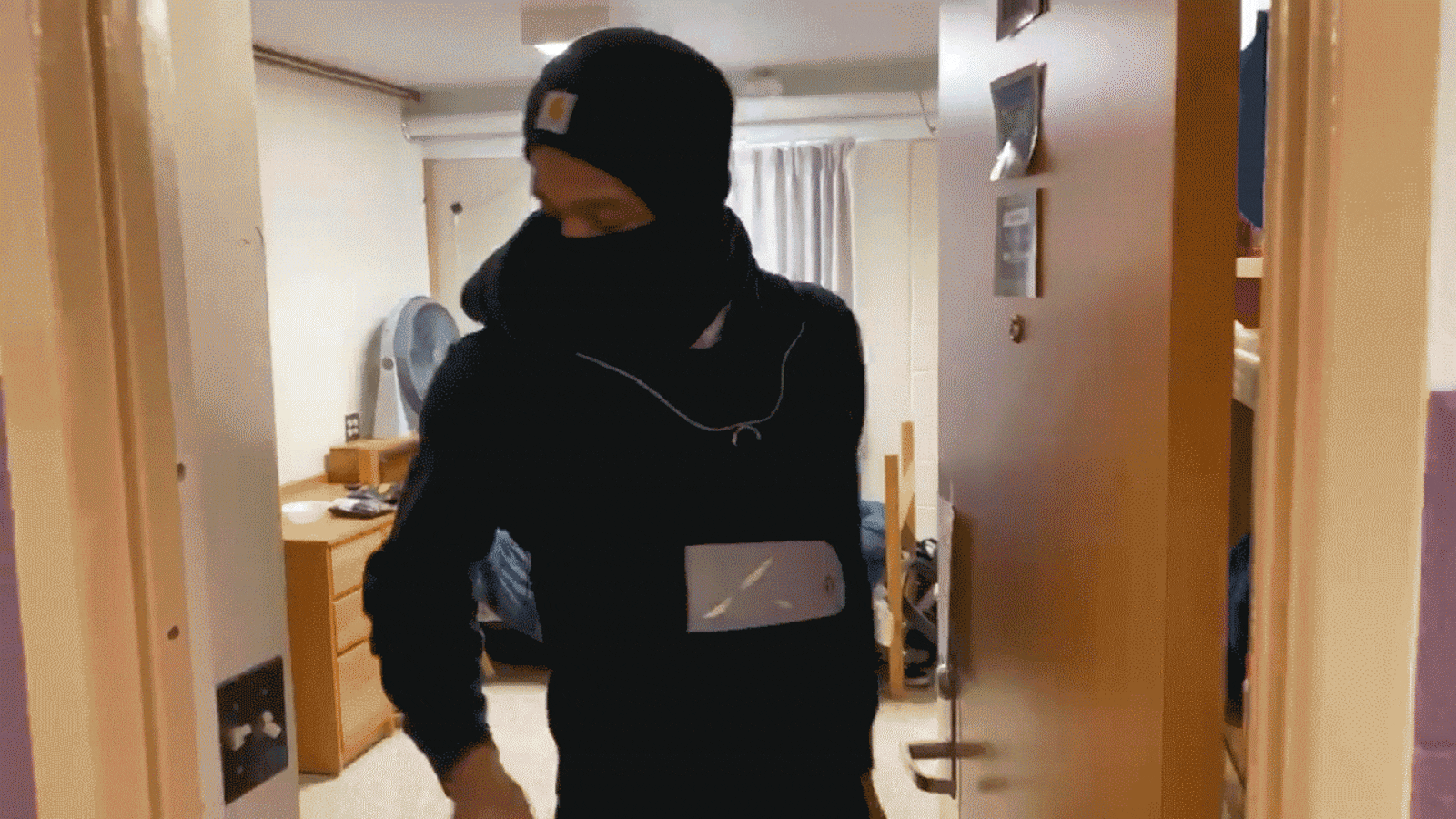One day soon, the weight of the coronavirus pandemic will hit Marqell McClendon.
The Detroit native will come to terms with the deaths of her uncle and great aunt. With the challenges of having to leave her college campus. With the disease that has devastated her community.
For weeks, though, McClendon kept her mind fixed solely on surviving a difficult shift to online classes. It’s a complicated transition that threatened to upend the momentum from her first semester, in which she did what seemed unthinkable a year ago: She made the dean’s list at Michigan State University.
“It hurts a little,” McClendon, a freshman, said as she contemplated her grades suffering as a result. “I’m trying the best that I can and my situation isn’t really my fault. But, it’s just not how I wanted to end my first year.”
Chalkbeat has been following McClendon and other first-year college students from Detroit this academic year, capturing their stumbles and successes to provide insight into what high school graduates from struggling communities need to succeed in college.
The abrupt, unsettling disruption to an already difficult first year has tested McClendon, as well as fellow college freshmen Kashia Perkins and Demetrius Robinson. None of them had ever taken an online class, so they were thrust into an unfamiliar learning environment with little preparation and with professors who were also feeling their way through this new reality.
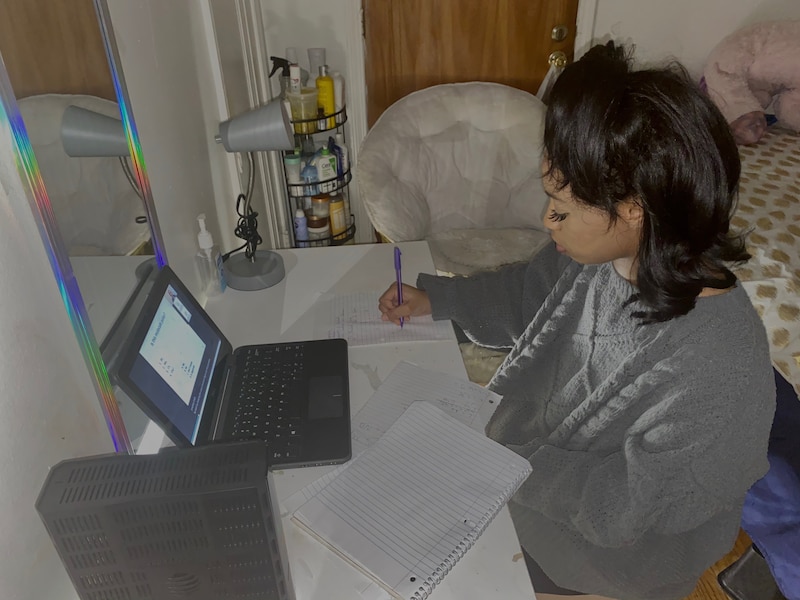
The global pandemic has also tested them in other ways. Robinson, a Central Michigan University student who dreams of taking over his family’s fitness business, has immersed himself in the details of COVID, lecturing his friends about taking precautions and being careful himself when he leaves home to cut his grandfather’s hair. He’s also had to mourn the loss of a family friend.
“I just wake up every day and do the things I know that I’m actually in control of.” - Marqell McClendon
Perkins, meanwhile, insulated herself by staying in her dorm on the MSU campus. The decision not to finish out the spring semester at home was a nod to her growing need for independence. But her insulation may also explain why she believes too much is being made of the seriousness of the virus.
As the virus spread through Detroit, shutting out the world around her was important for McClendon. She traded the solitude of her dorm room and favorite quiet spaces at Michigan State for the brick home she shares with her family on a quiet street on the city’s west side. Her bedroom and the home’s back porch are where she kept up with her studies. She tried not to think about the coronavirus, even though it has personally impacted her family.
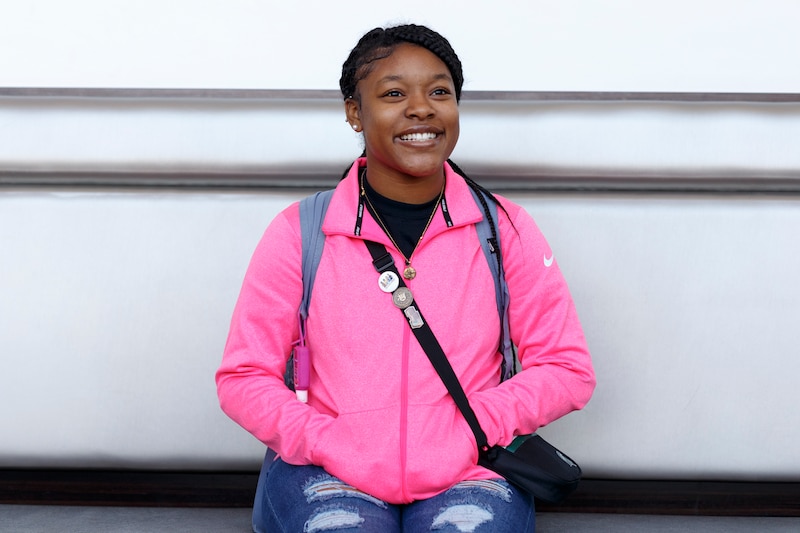
“It hit closer to home,” said McClendon, who last year was the valedictorian of her senior class at Cody High School in the Detroit school district. “What I’m actually doing … is not thinking about it at all. I just wake up every day and do the things I know that I’m actually in control of and I try not to worry about things too much.”
When we talked to McClendon several weeks ago, she said she hadn’t allowed herself time to mourn.
“I feel like I should try as hard as I can to focus on my schoolwork because I know that’s what everybody wants me to do instead of worrying. Eventually, I will mourn, because the semester is almost over.”
For McClendon and other Michigan State students, May 1 marked the end of finals.
‘I can’t do this online’
Despite the disparate ways they’ve coped with coronavirus, one thing unites the three: Their distaste for taking classes online and their worry that fall semester classes will also be conducted virtually.
“If this gets shut down until 2021, I don’t know if I’m going back to school. Because I can’t do this online,” said Robinson. “I would rather start school back when I can physically go back to the campus.”
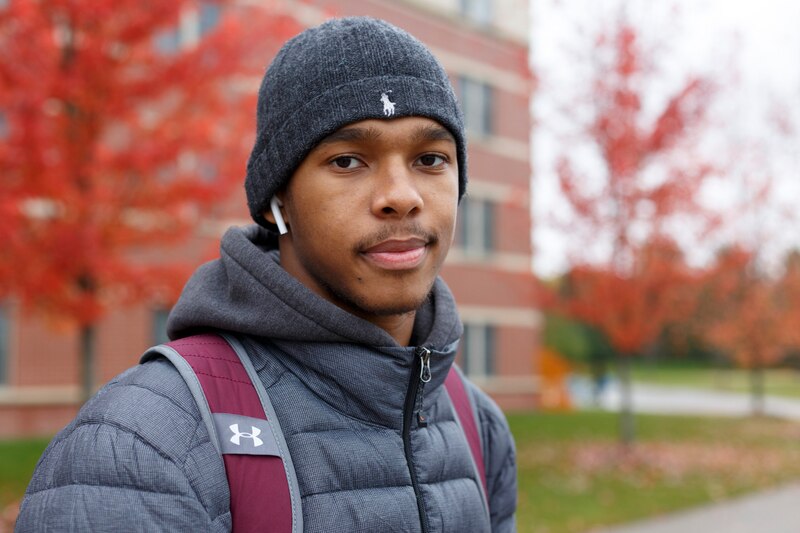
The switch online has been difficult for students across the board. But it’s been especially hard for those from struggling communities like Detroit, where many children come from low-income families.
“Our students come from backgrounds where they were already facing certain barriers, already facing certain stressors when it came to persisting through college,” said Terran Davis, the alumni success coordinator at the Jalen Rose Leadership Academy, the charter school from which Perkins and Robinson graduated. “This added pressure of the virus has definitely amplified some of these stressors.”
He and David Williams, who helps lead the college-going efforts at the high school, said the suddenness of the switch has been a factor. Some students don’t have the technology at home. Some don’t have the quiet space there to study. Others struggle to get school work done in the midst of family dynamics.
“The transition ... has not been smooth,” Williams said.
Some experts are worried about the emotional well being of college students nationwide who are coping with the pandemic. A national survey of 2,000 college students, completed in April by the advocacy group Active Minds, found that 80% of the students said COVID has negatively impacted their mental health.
“There are (mental health) resources still available to them,” said Jerry Caldwell, director of the Charles Drew Science Scholars at Michigan State. “We let them know that we are here to reach out to us if they have needs.”
“Our students come from backgrounds where they were already facing certain barriers, already facing certain stressors when it came to persisting through college.” - Terran Davis
The program helps students pursuing science and medical-related majors – most of them from underrepresented communities – with intense academic advising, academic coaching, career advising, and a connection to a tight-knit community. In the midst of the pandemic, they have worked to provide weekly “Zoom with Drew” activities, such as an event where the students played Pictionary and another night when they played trivia games.
They’re also making sure students have access to important resources such as food pantries, and tutoring. For instance, the program connected McClendon with someone to help her with her difficult chemistry class.
Longing for face to face connections
Anyone who knows Robinson, an extrovert who thrives when he’s around others, will understand why he dislikes online classes. He made it his mission as a freshman to meet as many people as he could and have his name known on campus.
“I like the face to face classes. I like going to my professors’ office hours. I like going after class, walking up to my professors and saying, ‘Hey, I didn’t quite understand what happened in class,” Robinson said.
This is important for Robinson. He struggled through his first semester, largely because he said he didn’t take advantage of opportunities to talk to professors about what he needed to work on to improve his grades. When we caught up with him earlier this year, he said he was finally feeling like a college student.
“I’m getting that feeling like, ‘Man, I’m really here. I’m here to stay.’ I’m settling down,” Robinson said in February. He had also begun spending more time talking to his professors and noticed a “drastic change” in his performance.
But then, while he was on spring break not even a month later, and visiting a friend who attends an Ohio university, the world changed. In-person classes were canceled and students were told not to come back to the university. Robinson had only a week’s worth of clothes and none of his school textbooks (“You weren’t bringing that book on your spring break.”)
He was still able to connect with his professors, but it wasn’t as easy. And, he said, there were the typical technical glitches that have come with such an abrupt switch to online classes, like the time everyone in one of his classes got disconnected from the live lesson, but the professor kept teaching because he didn’t know there was a problem.
Eventually, Robinson was able to visit campus and pick up the things he needed. Then he made a final trip last week to empty out what was left in his room. Robinson got some welcome news Monday afternoon. Central Michigan announced it is returning to face-to-face classes in the fall.
“Time to say bye bye until next year,” he said as he prepared to leave his dorm room for the last time as a freshman.
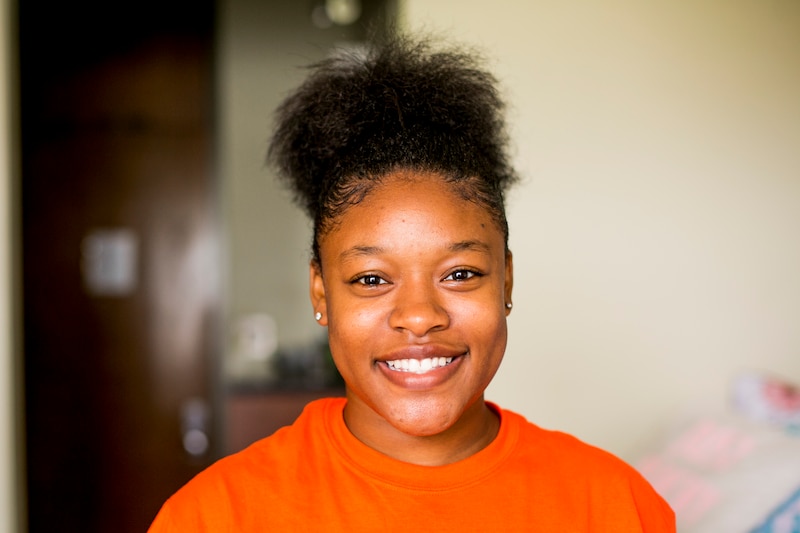
A campus safe haven
Perkins grew up in Detroit, and that’s where her family is, but home to her this year was her dorm room at Michigan State. And that’s where she opted to stay when the university president announced classes were moving online and students were encouraged to go home.
“I’m more of a visual learner.” - Kashia Perkins
“I’ve gotten so used to being on my own that I’d rather stay in my own space and do my work here,” Perkins said.
She was among about 800 students who remained on the campus. But while the setting was idyllic, the venue for classes wasn’t. She struggled to keep herself motivated to get up and get her classwork done. Her self discipline, she said, has been lacking. And she doesn’t feel like she’s learning as much as she would in a face-to-face class.
“I’m more of a visual learner,” Perkins said. “I would like to see you sit with me and do a problem together so I understand it.”
But it’s not just the switch to online classes that has been difficult. She misses the activities she was involved in. From the beginning, Perkins has been passionate about getting involved in clubs and organizations on campus, including a dance club that puts on regular performances.
The coronavirus has taken a toll on Perkins’ home town (at last count, the city had 1,213 COVID-related deaths and 9,897 people test positive). Still, Perkins — who plans to change her major from human biology to nursing — downplays the significance of the virus. She said it doesn’t worry her because she thinks government officials are making the pandemic seem worse than it is.
“People with weak immune systems … that’s really who it affects,” said Perkins, who cites statistics showing that most people who get it will survive.
“That’s why I feel like they’ve blown it out of proportion. They know people in this world will survive. They’re making it seem like if you get it, you’re going to die.”
Nationwide, 80,820 have died of COVID. In Michigan alone, there have been 4,674 deaths.
As she looks ahead to the fall semester, Perkins is hoping for a return to normal. She said she became too lazy this spring as she learned online, so she’s hoping the fall semester doesn’t begin virtually. (Michigan State officials plan to make a decision by early July)
“That’s not a good way to start off. I want to start the school year off strong so I can end the semester strong.”
‘Everything was just harder’
Throughout the fall semester, McClendon was aggressively seeking help with a difficult math class, including approaching strangers in her dorm and asking for assistance. The persistence paid off. She earned a 3.8 grade point average and a spot on the MSU dean’s list.
Earlier this year, she was already concerned about the increased rigor of this year’s classes, which include chemistry, another difficult math class, and physiology. She was determined to maintain that grade point average.
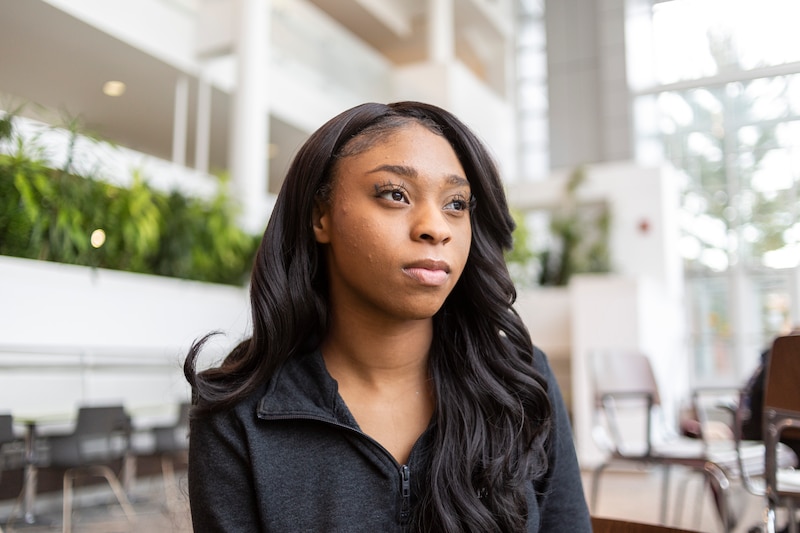
Then the pandemic came, and suddenly, “everything was just harder,” McClendon said. “It’s harder to learn because basically we’re teaching ourselves.”
She struggled to keep up with her classes and to stay organized, especially for those courses where her professors record their lectures and students can watch the lectures at their own pace.
“Every time I look up, I’ll have three assignments due that I knew nothing about because it’s not like you go to class and then your professors remind you that you have something due.”
There were more than a few missing assignments. She also missed entire classes. It prompted her to create a chart so she could more easily keep up.
Math became an even bigger problem than it was last semester, and this time, the resources she relied on — such as going to the math resource center on campus and getting hands-on help — weren’t so handy.
“I think my grades are declining right now,” she said several weeks ago.
The confirmation came this week. McClendon passed all her classes. But she earned far fewer credits, dropping her cumulative GPA to a 3.0, still not bad for a first-year freshman.
But that’s not enough for this determined student, who puts a lot of pressure on herself to do her best.
“Hopefully, we’re not doing online next semester so I can do better.”
This story is part of a partnership with Detroit Public Television. It was produced with support from the Education Writers Association Reporting Fellowship program.

